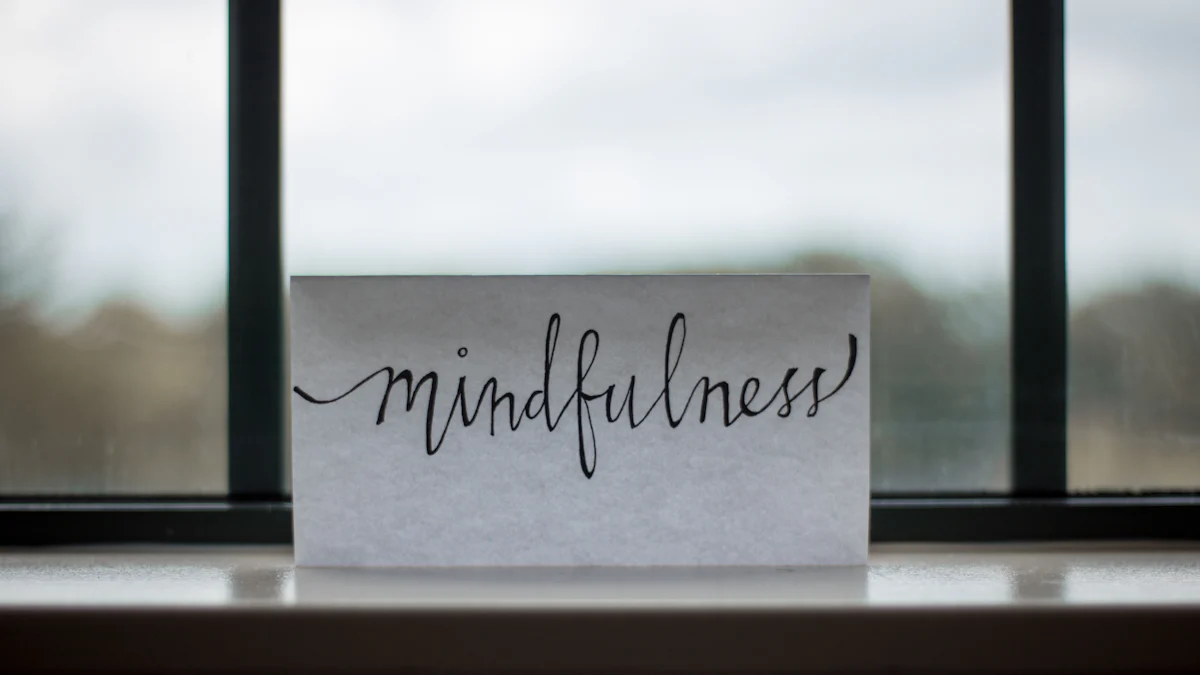The Mental Health Benefits of Living Consciously

Living consciously involves being fully present and aware of one's thoughts, actions, and surroundings. This approach to life encourages mindfulness and intentionality. Mental health has become a critical concern in today's society. Over 970 million people globally live with mental disorders, including anxiety and depression. More than 1 in 5 adults describe their mental health as only 'fair' or 'poor'. The purpose of this blog is to explore the benefits of conscious living on mental health.
Understanding Conscious Living

Definition and Principles
What is Conscious Living?
Conscious living means being fully present in every moment. This lifestyle involves awareness of thoughts, actions, and surroundings. People who live consciously make deliberate choices. These choices align with personal values and goals. Conscious living promotes a mindful and empowered way of life.
Core Principles of Conscious Living
Several core principles define conscious living. Mindfulness stands as a key principle. Mindfulness involves paying attention to the present moment without judgment. Another principle is intentionality. Intentionality means making deliberate choices that reflect personal values. Self-awareness also plays a crucial role. Self-awareness involves understanding one's emotions, thoughts, and behaviors. Finally, gratitude enhances conscious living. Practicing gratitude fosters a positive outlook on life.
The Connection Between Conscious Living and Mental Health
Mindfulness and Awareness
Mindfulness and awareness significantly impact mental health. Mindfulness practices reduce stress levels. People who practice mindfulness experience lower anxiety. Awareness helps individuals recognize negative thought patterns. Recognizing these patterns allows for better emotional regulation. Studies show that mindfulness improves overall mental well-being.
Intentionality in Daily Actions
Intentionality in daily actions enhances mental health. Making deliberate choices reduces feelings of overwhelm. Intentional actions promote a sense of control over life. This sense of control leads to greater life satisfaction. Intentional living also improves self-esteem. People feel more confident when their actions align with their values.
Living consciously offers numerous mental health benefits. Reduced stress, improved emotional regulation, and enhanced self-awareness are just a few. Embracing conscious living can lead to a healthier, more fulfilling life.
Benefits of Conscious Living
Reduced Stress and Anxiety
Mindfulness Practices
Mindfulness practices provide a powerful tool for reducing stress and anxiety. Meditation encourages individuals to focus on the present moment. This focus helps to quiet the mind and reduce negative thoughts. Breathing exercises also play a crucial role. Deep, controlled breathing calms the nervous system and lowers stress levels. Journaling offers another effective mindfulness practice. Writing down thoughts and feelings helps to process emotions and gain clarity.
Stress Management Techniques
Stress management techniques enhance the benefits of conscious living. Time management stands as a key technique. Prioritizing tasks and setting realistic goals prevent feelings of overwhelm. Physical activity also reduces stress. Exercise releases endorphins, which improve mood and reduce anxiety. Relaxation techniques such as yoga and tai chi promote physical and mental relaxation. These practices help to create a balanced and stress-free lifestyle.
Improved Emotional Regulation
Recognizing and Managing Emotions
Recognizing and managing emotions improve emotional regulation. Self-awareness plays a vital role in this process. Understanding personal triggers and emotional responses allows for better control over reactions. Techniques such as cognitive-behavioral therapy (CBT) offer practical tools. CBT helps individuals identify and challenge negative thought patterns. This approach leads to healthier emotional responses and improved mental well-being.
Building Emotional Resilience
Building emotional resilience strengthens mental health. Resilience involves the ability to bounce back from adversity. Developing coping strategies enhances resilience. Positive self-talk and problem-solving skills contribute to this process. Social support also plays a crucial role. Building strong relationships provides a network of support during challenging times. Emotional resilience leads to greater life satisfaction and overall well-being.
Enhanced Self-Awareness and Self-Esteem
Self-Reflection Practices
Self-reflection practices enhance self-awareness. Regular self-reflection helps individuals understand their thoughts, actions, and motivations. Techniques such as journaling and meditation facilitate this process. Reflecting on personal experiences promotes growth and self-improvement. Increased self-awareness leads to more informed decisions and intentional living.
Positive Self-Image
A positive self-image boosts self-esteem. Embracing personal strengths and achievements fosters a healthy self-image. Affirmations and positive self-talk reinforce self-worth. Setting and achieving personal goals also contribute to a positive self-image. Celebrating successes, no matter how small, builds confidence and self-esteem. A strong self-image enhances overall mental health and well-being.
Better Relationships
Conscious Communication
Conscious communication enhances relationships. This practice involves active listening and clear expression. Active listening requires full attention to the speaker. Clear expression ensures that thoughts and feelings are conveyed accurately. Both parties feel heard and understood through conscious communication. This mutual understanding reduces conflicts and misunderstandings. Conscious communication fosters a deeper connection between individuals.
Building Empathy and Understanding
Building empathy and understanding strengthens relationships. Empathy involves recognizing and sharing the feelings of others. Understanding requires acknowledging different perspectives. These practices create a supportive environment. People feel valued and respected in such an environment. Empathy and understanding lead to more compassionate interactions. Stronger bonds and trust develop through these positive interactions.
Living consciously offers numerous mental health benefits, including better relationships. Conscious communication and empathy contribute to healthier connections. Embracing these practices can lead to more fulfilling and harmonious relationships.
Practical Tips for Living Consciously

Daily Mindfulness Practices
Meditation and Breathing Exercises
Meditation offers a powerful way to cultivate mindfulness. Regular meditation sessions help individuals focus on the present moment. This practice reduces stress and enhances mental clarity. Breathing exercises also play a crucial role. Deep, controlled breathing calms the nervous system. This technique lowers anxiety levels and promotes relaxation. Both practices contribute to a balanced and mindful lifestyle.
Journaling and Reflection
Journaling serves as an effective tool for self-reflection. Writing down thoughts and feelings helps process emotions. This activity provides clarity and insight into personal experiences. Reflecting on journal entries promotes growth and self-awareness. Regular journaling encourages intentional living. This practice enhances mental well-being and fosters a deeper understanding of oneself.
Setting Intentions and Goals
Creating a Vision Board
A vision board acts as a visual representation of personal goals. Creating a vision board involves selecting images and words that reflect aspirations. This process helps clarify intentions and motivates action. A vision board serves as a daily reminder of goals. This visual tool keeps individuals focused and inspired. Setting clear intentions through a vision board promotes a purposeful life.
Regular Goal Review and Adjustment
Regularly reviewing and adjusting goals ensures progress. This practice involves evaluating current goals and making necessary changes. Adjusting goals based on new insights and experiences fosters growth. Regular goal review helps maintain alignment with personal values. This process promotes continuous improvement and intentional living. Consistent goal evaluation enhances overall life satisfaction.
Cultivating Gratitude
Gratitude Journals
Gratitude journals offer a simple yet powerful way to cultivate gratitude. Writing down things to be thankful for shifts focus to positive aspects of life. This practice fosters a positive outlook and reduces negative thinking. Regular entries in a gratitude journal enhance mental well-being. This activity promotes a sense of contentment and appreciation. Gratitude journaling contributes to a happier and more fulfilling life.
Expressing Thanks to Others
Expressing thanks to others strengthens relationships. Acknowledging the kindness and support of others fosters connection. This practice creates a positive and supportive environment. People feel valued and appreciated when their efforts are recognized. Expressing gratitude enhances social bonds and promotes empathy. This habit leads to more harmonious and fulfilling relationships.
Living consciously offers numerous mental health benefits. Daily mindfulness practices, setting intentions, and cultivating gratitude contribute to a balanced and intentional life. Embracing these practices can lead to improved mental well-being and overall happiness.
Living consciously offers numerous mental health benefits. Mindfulness reduces stress and anxiety. Emotional regulation improves through self-awareness. Enhanced self-esteem and better relationships contribute to overall well-being.
Start incorporating conscious living practices into daily routines. Simple steps like meditation, journaling, and setting intentions can make a significant difference.
"Living consciously means coming to terms with yourself," says an expert in conscious living. Embrace this journey to experience a more fulfilling and balanced life.
See Also
Ways to Integrate Sacred Self-Care in Your Everyday Schedule
Achieving Self-Kindness for Individual Development
Crafting a Peaceful Morning Schedule for Improved Psychological Health
Deciphering the Path to a Prosperous Technology Cleanse for Mental Wellness

